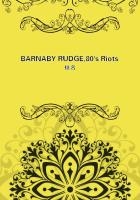
第96章
'I would,' said Mr Chester, leaning over her, and speaking in mild and quite venerable accents; 'I would, dear girl, it were my task to banish, not increase, those tokens of your grief. My son, my erring son,--I will not call him deliberately criminal in this, for men so young, who have been inconstant twice or thrice before, act without reflection, almost without a knowledge of the wrong they do,--will break his plighted faith to you; has broken it even now.
Shall I stop here, and having given you this warning, leave it to be fulfilled; or shall I go on?'
'You will go on, sir,' she answered, 'and speak more plainly yet, in justice both to him and me.'
'My dear girl,' said Mr Chester, bending over her more affectionately still; 'whom I would call my daughter, but the Fates forbid, Edward seeks to break with you upon a false and most unwarrantable pretence. I have it on his own showing; in his own hand. Forgive me, if I have had a watch upon his conduct; I am his father; I had a regard for your peace and his honour, and no better resource was left me. There lies on his desk at this present moment, ready for transmission to you, a letter, in which he tells you that our poverty--our poverty; his and mine, Miss Haredale--
forbids him to pursue his claim upon your hand; in which he offers, voluntarily proposes, to free you from your pledge; and talks magnanimously (men do so, very commonly, in such cases) of being in time more worthy of your regard--and so forth. A letter, to be plain, in which he not only jilts you--pardon the word; I would summon to your aid your pride and dignity--not only jilts you, I
fear, in favour of the object whose slighting treatment first inspired his brief passion for yourself and gave it birth in wounded vanity, but affects to make a merit and a virtue of the act.'
She glanced proudly at him once more, as by an involuntary impulse, and with a swelling breast rejoined, 'If what you say be true, he takes much needless trouble, sir, to compass his design. He's very tender of my peace of mind. I quite thank him.'
'The truth of what I tell you, dear young lady,' he replied, 'you will test by the receipt or non-receipt of the letter of which I
speak. Haredale, my dear fellow, I am delighted to see you, although we meet under singular circumstances, and upon a melancholy occasion. I hope you are very well.'
At these words the young lady raised her eyes, which were filled with tears; and seeing that her uncle indeed stood before them, and being quite unequal to the trial of hearing or of speaking one word more, hurriedly withdrew, and left them. They stood looking at each other, and at her retreating figure, and for a long time neither of them spoke.
'What does this mean? Explain it,' said Mr Haredale at length.
'Why are you here, and why with her?'
'My dear friend,' rejoined the other, resuming his accustomed manner with infinite readiness, and throwing himself upon the bench with a weary air, 'you told me not very long ago, at that delightful old tavern of which you are the esteemed proprietor (and a most charming establishment it is for persons of rural pursuits and in robust health, who are not liable to take cold), that I had the head and heart of an evil spirit in all matters of deception.
I thought at the time; I really did think; you flattered me. But now I begin to wonder at your discernment, and vanity apart, do honestly believe you spoke the truth. Did you ever counterfeit extreme ingenuousness and honest indignation? My dear fellow, you have no conception, if you never did, how faint the effort makes one.'